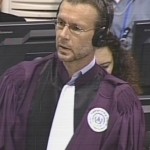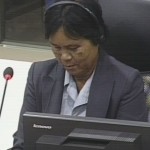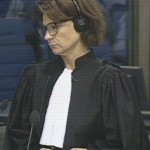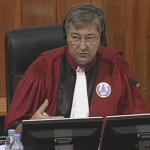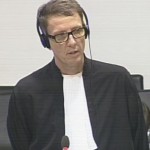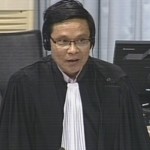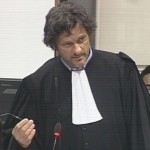“After they arrived at the Pagoda, the Pagoda was silent.” -Witness on 1st January Dam
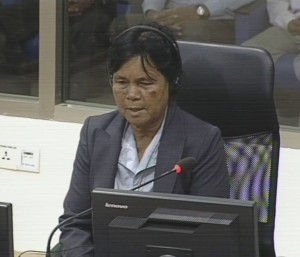
Witness Ms. Kang Uth (កង អ៊ុត) testifying before the ECCC on June 25, 2015 – (All photos courtesy of Kim Sovanndany from DC-Cam)
Today, on June 25, the last day before the summer recess, the Trial Chamber heard Ms. Kang Uth (កង អ៊ុត), a witness related to the 1st January Dam. (The Supreme Court Chamber will convene, though, starting July 2nd to hear three defense witness).
Ms. Uth was born in 1951 in Troh village, Balangk commune, Baray district, Kampong Thom province. She is currently a rice farmer. Her father’s name is Kang Chork her mother’s name is Em Chab. She has two children together with her husband Sem Ry.
Mr. Vincent de Wilde, Senior Assistant Prosecutor, started off the examination of this witness. The Court granted the prosecution and civil party lawyers a combined time of two sessions.
Ms. Uth was part of a mobile unit between 1975 and 1977. Comrade Ngim, a woman, was the chief of her unit but she cannot recall the name of her direct supervisor. The prosecutor would later remind her that she had mentioned in her OCIJ statement that Yoeng was her direct supervisor. She confirmed that Yoeng was the chief of her group of 10+ members and that she was still alive today.
The mobile unit belonged to her village and their were 10+ members.
1st January Dam
She confirms that she went to the 1st January Dam in 1977, still as a part of the same unit. The 1st January Dam was called a “hot battlefield” back then, because, according to Ms. Uth, the intensive nature of the work. She was there for four or five months.
She says that they were instructed to work hard and with little rest. The aim was to complete the work “sooner.”
Ms. Uth confirmed what she had said in her OCIJ statement, that there were tens of thousands of workers at the 1st January Dam site . She said that most of them were from Kampong Speu and Kampong Cham and most of them were young men and woman in mobile unit.
“Why were you sent to work at the Dam?” Mr. De Wilde asked.
“If the women were single, the would be sent there because they believed that single women would posses more strength to work,“ she responded.
She also said that there were no children working at the site, that the average age was 20 or above.
Ms. Uth said that most of them were 22, 23 or 24 years old and most of them were “New People.”
She also said that there were Cham people who lived in the village “and they joined work with us.” The lived in the village because they had been evacuated from “somewhere else,” she said.
—
Work schedule
Ms. Hun confirmed her OCIJ statement where she had said that she woke up at 4 a.m. and only went to bed at midnight.
“Why did you work so hard and sleep so little?” Mr. de Wilde asked.
“We were not explained why. We were told to work hard,” she responded.
Ms. Uth then explained that male workers did the digging and female workers only did the earth carrying work.
Living Conditions
Mr. de Wilde read from her OCIJ statement where she had said: “We were given two meals of rice per day: one at 11 a.m. and the other at 5 p.m. There was only one kind of soup which contained small fish and leaves.”
“So your first meal was at 11 a.m. What did you do to have enough energy to work from 4 a.m. to 11 a.m. without eating?” Mr. de Wilde asked.
“I had to endure the working conditions, even though I was exhausted at that time and I was injured,” Ms. Uth responded.
In her OCIJ statement, Ms. Uth said that “many workers fell sick because they worked beyond their strength.” Mr. De Wilde then asked why these workers would not complain and say that they were too tired too work?
“No one had the courage to tell the chief,” Ms. Uth said, “we had to work until we could not, and then we told the chief.”
Wat Baray Choan Dek Pagoda
Ms. Uth confirms that the Wat Baray Choan Dek Pagoda is in her village, Troh village, Balangk commune, Baray district, Kampong Thom province and that it is a bit removed from the 1st January Dam worksite.
“People from Kampong Cham were evacuated to the Pagoda and they were executed,” she said “I did not see the killings as we were not allowed to go inside, but we noticed the very unpleasant smell outside of the Pagoda.”
Ms. Uth said the people from Kampong Cham arrived in oxcarts at night to the Pagoda and that she saw them arrive. They didn’t go to the 1st January Dam Site to work.
“After they arrived at the Pagoda, the Pagoda was silent,” she said. “The Pagoda was turned into a security center,” she continued , “prisoners were arrested and detained at the security center. Some were killed and some were released and as for the people that were transferred from somewhere else into that security office, they were killed.”
She says she has no knowledge of where the workers from the 1st January Dam were taken away to or whether there were Cham among them.
She doesn’t have any knowledge of cages in the forest which had been mentioned by another witness.
–
Ms. Marie Guiraud, International Civil Party Lead Co-Lawyer, took the floor and asked about her marriage during the DK regime.
Ms. Uth confirmed that Angka arranged her marriage in 1977 together with 25 other couples. Only two of the twenty five couples were from her village, Troh. The ceremony was held in another village. The chief of her unit was the one who informed her that she was getting married.
The chief of the unit did not consult her parents “but her parents had discussed this before.”
She did know her future husband because they lived in the same village. She was informed that she was going to get married the day before, but her parents knew in advance that they were going to get married.
She remembers feeling that she did not want to get married, but she had to go anyways. She did not dare to refuse the marriage.
“If I dared to refuse the marriage, I would be accused of being against Angka. I had to accept [the marriage],” she said.
Ms. Uth said that there was nothing in common with today’s marriages.
Ms. Uth was confronted with Meas Layhour’s testimony (she was also from the same village, Troh) where she had said before this Chamber that:
“After my marriage militia men came to watch over us.. to see if we were delighted .. if they had caught us burning incense they would have taken us away and killed.. I was not the only watched over.. the militia men watched over all the married couples. “
Ms. Uth doesn’t remember and doesn’t believe that militia men came to watch over them to see if they had consummated their marriage.
She had her two children with this same man and she is still married to him.
–
To Judge Lavergne, Ms. Uth said that she “never saw any workers arrested at the 1st January Dam.” She said she only knew about one Cham woman who disappeared.
She could not give an estimate of how many people she saw taken into the Wat Baray Choan Dek Pagoda. She said that after the DK regime fell, she went back to her village. Her house in Troh village is not far from the Pagoda’s fence. At that time she saw four or five pits next to the Pagoda, and that “the pits were pretty large in size.”
She could not say how many bodies were there but she knows that “skeleton remains and skulls were collected as evidence of the crimes committed during the regime.” These bones were placed in a Stuppa inside the Pagoda compound, she said.
She also confirmed that most of the people who disappeared form her village were “New People” and that none of her family members died during the DK regime.
—
After lunch, Mr. Victor Koppe, defense counsel for Nuon Chea, started the cross-examination.
Mr. Koppe first asked her about her marriage.
Ms. Uth insisted that it was the village chief that initiated the idea and went and told her parents. She told the court that her parents did not object to the marriage. Ms. Uth also said that she agreed with the decision of her parents.
She said she spent her first night with her husband in a room with blanket and pillows. She said that there were no mosquito nets at that time.
Mr. Koppe then asked her if that was the same reason that there were no mosquito nets at the 1st January Dam. Ms. Uth said that that was right, that there were no mosquito nets at the time.
Koppe attempts to ask if there was a rotation of groups of workers at the 1st January Dam since she had been moved to do rice farming after the Dam, perhaps after three or four or five months. She said that it was because she was married that she was put in another group, but insisted that there was no rotation.
Ms. Uth said that she did get a desert every ten days, when she had a day off. She also said that on those days she could do whatever she wanted.
—
Mr. Koppe confronted her with the testimony of Mr. Or Ho, (she said he knew him and that he had been a chief in her commune) who had said before the Chamber that work started at 6:30 a.m. at the 1st January Dam. Some other witnesses, Mr Koppe said, had said work started at 7 a.m. Ms. Uth insisted that work started at 4 a.m.
“No, the work did not start at 7 a.m,” Ms. Uth said “7 a.m. was the time we had a ten minute break. “
Mr. Koppe then confronted her with the testimony of Ms. Meas Layhour (who allegedly was from her same village) in which Ms. Layhour had said that the lunch break started at 2 p.m. Ms. Uth maintained her testimony.
“I had lunch from 11 a.m. to 1 p.m. and after that I resumed work,” Ms. Uth said.
“Were you carrying a watch?” Mr. Koppe asked.
“I did not have a watch but the time was set very clearly. They rang the bell exactly at 1 p.m,” Ms. Uth replied.
Ms. Uth also insisted that night work was regular and not on special occasions as Ms. Meas Layhour had told the Chamber.
—
Mr. Liv Sovanna, national co-counsel for Nuon Chea, then took the floor.
Mr. Sovanna first asked if it really was the decision of her parents for her to get married and not of the village chief.
Mr. de Wilde and Judge Lavergne rose in objection but the witness is allowed to respond and says that yes, it was her parent’s decision. Mr. de Wilde takes the floor anyways and explains that it is too late but he wants to make clear that she had clearly stated that her parents accepted after the village chief had made the decision because they dared not refuse. Judge Lavergne also said that the process should continue as the objection is now moot.
Mr. Sovanna then gives the testimony of a witness who allegedly had said that they only work at night when the moon was waxing.
Mr. de Wilde rises in objection and this time the witness is asked to refrain from answering. Mr. de Wilde asks that if counsel wants to confront the witness with testimony from other witness he has to cite the reference.
Mr. Sovanna rephrases to ask if when she worked at night there was any light.
Ms. Uth replied: “When I did the night work, there were lights turned on. The lights were attached to poles.”
—
Mr. Arthur Vercken, Co-Lawyer for Khieu Samphan, was then given the floor with a few questions.
He first clarified that both her daughters were born after the fall of the DK regime.
Ms. Uth also said that she was allowed to visit her husband on her days of rest but that did not last for long because she was later re-assigned to other areas. She was only allowed to visit him occasionally.
Ms. Uth insists that during the regime there were no mosquito nets.
—
The defense counsel forgo one whole session for the cross-examination of this witness and the court adjourned one-and-a-half hour early.
The trial Chamber will resume on Monday the 27 of July 2015, but the Supreme Court Chamber will hear three defense witness starting on July 2nd.
The Trial Chamber will resume after the mid-year recess with testimony on the Trapeang Thma Dam Worksite. The parties have already been notified of the witnesses and civil parties for that segment.

